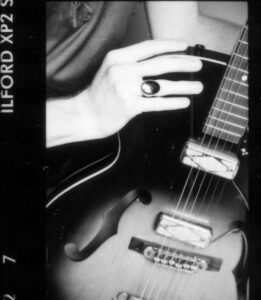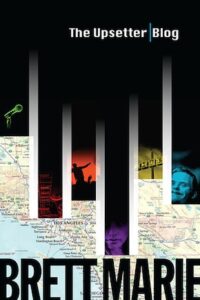Blind ricochets and unexpected avenues
by Brett Marie “We want Jack! We want Jack! We want Jack!”
“We want Jack! We want Jack! We want Jack!”
It starts with just one voice, some anonymous drunken loser without a girlfriend to embarrass, hidden deep within the chattering mass of denim and leather. Cliché to begin with, those three syllables sound particularly obnoxious coming from just one person. But a restless herd of kindred spirits surrounds him, each cut from the same Miller-soaked cloth, and his knuckleheaded call-to-arms is all they require. Within seconds, loner turns to leader as his chant catches the fancy of an eager crowd.
“We want Jack! We want Jack!”
Two hundred fists punch the air with each shouted word. Scattered rebel yells provide shrill counterpoint as the atonal anthem crescendos. The noise crests at an oppressive volume, when suddenly the refrain disperses, melting into a tide of self-satisfied cheers. The crowd has found release, but the focus of its anticipation remains unchanged: the stage remains empty.
Peering out the control-room window onto the club floor, I have to admit I’m impressed. I say as much as I turn to the object of their desire. “What do you have to say about that? They weren’t doing that six months ago.”
Jack Hackett answers with a shrug. This is the most elaborate and articulate he’s been with me all day; the kid has been downright catatonic since I greeted him here at the Mint this evening. His sullen eyes bulge like gumballs from his pale, gaunt face. Leaning with one hand against the mixing board, he slouches limply forward, his head upright at an angle that calls to mind a marionette with all but one of its strings cut.
There are seven of us cocooned with the kid in this compact control room: me, my son the Fan, the kid’s three bandmates, the roadie, and the engineer. Fourteen eyes watch the kid reach into the knapsack at his feet.”
His mood, I understand, was better this afternoon. I’m told he spoke at full voice, instructing the Mint staff to place a ‘Reserved’ placard at a table directly in front of his microphone. He insisted she was coming – that she must be coming, that she wouldn’t stay away from him on a night like this.
As much as I would have cringed at such delusional talk, I would take it in a heartbeat over his crushed silence now, as it becomes apparent he was wrong.
“We want Jack! We want Jack!”
The soundproofed walls are no match for the pounding of the renewed chant. Louder this time, the words manage to breach the kid’s eardrums, and he breaks his sightless stare.
There are seven of us cocooned with the kid in this compact control room: me, my son the Fan, the kid’s three bandmates, the roadie, and the engineer. Fourteen eyes watch the kid reach into the knapsack at his feet.
“We want Jack! We want Jack!”
His hand emerges clutching a yellow CD case. I recognize the cover photo, the blue block letters across the top: it’s his Chuck Berry greatest-hits collection. As he locates a CD deck in the rack full of recording gadgetry, I entertain the thought that he will counter the crowd’s onslaught with a full-volume ‘Johnny B. Goode’. Maybe, I think, the driving rhythm will jumpstart his heart, and we’ll have him back.
“We want Jack! We want Jack!”
But then the light jangle of Berry’s guitar makes a meager peep between chants. I don’t need to hear the first line to recognize ‘Memphis, Tennessee’, the closest thing the kid will find on that CD to a song that can evoke his pain. My silly illusion of a moment ago dissolves even before Chuck’s soft plea to Long Distance Information comes in.
“We want Jack! We want Jack!”
My fellow control room inmates sit silent for some time. Over the outside din, Chuck begs for the listener to get in touch with his Marie. A full verse plays before the Fan gets fidgety. “Great song!” he says, and waits for the kid to agree.
“We want Jack! We want Jack!”
The kid stares hard at the nearest speaker. The Fan looks at me and frowns. Jack’s bandmates stare at their leader, murmuring among themselves.
“We want Jack! We want Jack!”
Another minute passes before Berry’s guitar chimes in to bring the curtain down on the song. At the same time, the faithful outside break up their chant and applaud themselves once more. With the clock ticking down to zero-hour, the seven of us watch Jack reach for a button on the CD player. And now the jangle is back, light and sad as before, and here is Chuck’s voice, just as pleading. And Jack’s eyes, now sunken a smidgen further behind his bangs, stare just as intently at the speaker playing his request.
Give credit to the divine. Do that, and you can enjoy the fantasy that we are more than merely so many billiard balls waiting to be sunk into our respective pockets simply by the laws of physics and luck.”
We live and die by coincidence, don’t we? Well-timed bolts from the blue send us reeling from one life-altering event to the next, finding their logic only as a series of blind ricochets stretching back to the Big Bang. Every instant a trillion atoms bounce off each other to spin off down new and unexpected avenues, while the doors to the old slam shut behind them. Soulmates meet by chance. Lightning strikes men dead. Ignore the millions of near-misses. Give credit to the divine. Do that, and you can enjoy the fantasy that we are more than merely so many billiard balls waiting to be sunk into our respective pockets simply by the laws of physics and luck.
Billiard balls, or marbles. A boy grows up in a small New England town, steeped in the music of his day, dreaming of worldwide stardom in the mold of his hero Elvis Presley. He spends his paper-route money on a rock ’n’ roll guitar, learns a few chords. All seems to flow toward his destiny as surely as a river to the sea.
But more powerful than a healthy boy of fourteen, mightier than his planet-sized dream, is the force of a tiny cat’s-eye marble, lying by chance on a patch of hard earth along the third base line of the sandlot where on a summer’s day he joins a pick-up ballgame.
What explosive power that small marble exerts on a teenager racing for home plate, when it absorbs the boy’s full weight at just the right angle, when it rolls a mere inch under the sole of his sneaker. For the chain reaction it sets off, starting with the fall that snaps his left middle finger, derails him from far more than a run scored. The splint it earns his hand, his finger’s failure to heal enough to fret his guitar properly, they knock him sideways from his destiny, sending him careening down a wildly different track. What a mighty David’s stone that cat’s-eye is, fired from the sling of a blind, capricious fate.
This notion enjoys a firm place in the bedrock of my brain, a place into which years of experience have served only to further entrench it. As I stand in a small control room, in a Los Angeles nightclub one night in November, watching John Preston Hackett III sit in quiet desolation while beyond the door two hundred voices chant his name, this idea’s place seems permanent, assured.
But the billiard balls and marbles of fate are still colliding, and they are indeed powerful things.
from The Upsetter Blog (Owl Canyon Press, £14.99/$19.95)
Brett Marie, also known as Mat Treiber, grew up in Montreal with an American father and a British mother and currently lives in Herefordshire. His short stories and other writing have appeared in publications including The New Plains Review, The Impressment Gang, PopMatters and Bookanista, where he is a contributing editor. The Upsetter Blog is out now from Owl Canyon Press.
Read more
@owlcanyonpress
Facebook: Brett Marie
@brettmarie1979
bookanista.com/author/brett-marie/


